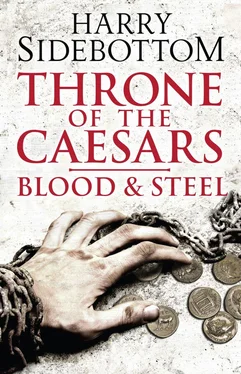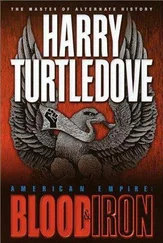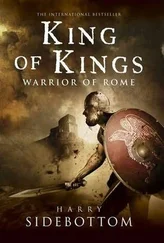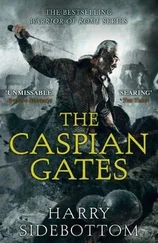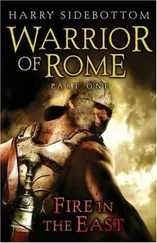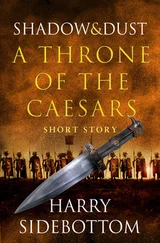Harry Sidebottom - Blood and Steel
Здесь есть возможность читать онлайн «Harry Sidebottom - Blood and Steel» — ознакомительный отрывок электронной книги совершенно бесплатно, а после прочтения отрывка купить полную версию. В некоторых случаях можно слушать аудио, скачать через торрент в формате fb2 и присутствует краткое содержание. Год выпуска: 2015, ISBN: 2015, Издательство: HarperCollins Publishers, Жанр: Исторические приключения, на английском языке. Описание произведения, (предисловие) а так же отзывы посетителей доступны на портале библиотеки ЛибКат.
- Название:Blood and Steel
- Автор:
- Издательство:HarperCollins Publishers
- Жанр:
- Год:2015
- ISBN:9780007499908
- Рейтинг книги:3 / 5. Голосов: 1
-
Избранное:Добавить в избранное
- Отзывы:
-
Ваша оценка:
- 60
- 1
- 2
- 3
- 4
- 5
Blood and Steel: краткое содержание, описание и аннотация
Предлагаем к чтению аннотацию, описание, краткое содержание или предисловие (зависит от того, что написал сам автор книги «Blood and Steel»). Если вы не нашли необходимую информацию о книге — напишите в комментариях, мы постараемся отыскать её.
Blood and Steel — читать онлайн ознакомительный отрывок
Ниже представлен текст книги, разбитый по страницам. Система сохранения места последней прочитанной страницы, позволяет с удобством читать онлайн бесплатно книгу «Blood and Steel», без необходимости каждый раз заново искать на чём Вы остановились. Поставьте закладку, и сможете в любой момент перейти на страницу, на которой закончили чтение.
Интервал:
Закладка:
Ballistarii : Roman artillerymen, named from their weapon, the ballista .
Barbii : The Barbius family.
Basilica Aemilia : Court building on the northeastern side of the Roman Forum, originally built in 179BC and restored on several occasions in antiquity.
Basilica of Neptune : Monumental building adjoining the rear of the Pantheon, facing south.
Basilica : Roman court building and audience chamber.
Baths of Trajan : Large bathing and leisure complex dedicated by the Emperor Trajan in AD109, built on the flank of the Esquiline Hill overshadowing the adjacent Baths of Titus.
Batnae : Town in southeastern Turkey; modern Suruç.
Bay of Naxos : Named from an ancient Greek city on the eastern shore of Sicily.
Belenus : Celtic sun god and patron deity of Aquileia.
Bithynia-Pontus : Roman province along the south shore of the Black Sea.
Bona fides : Latin, literally ‘good faith’.
Bononia : Modern Bologna in northern Italy.
Borysthenes : Maximinus’s horse, named from the god of the river Dnieper in Greek mythology.
Boule : Council of a Greek city; in the Roman period made up of local men of wealth and influence.
Britannia Inferior : One of two Roman provinces of Britain, located in northern England.
Brundisium : Important port on the southeastern coast of Italy, modern Brindisi.
Bucellarii (singular Bucellarius ): Literally ‘biscuit-eater’; in the later Roman Empire, units of troops raised and led by private individuals, usually governors or generals, as their personal guard.
Caecuban : A highly prized sweet white wine grown in the coastal region south of Rome.
Caelestis : Roman virgin goddess of divine balance.
Caelian : One of the seven legendary hills of Rome, lying southeast of the Roman Forum.
Caesar : Name of the adopted family of the first Roman Emperor, subsequently adopted as one of the titles of the office; often used to designate an Emperor’s heir.
Caesaraugusta : Roman town in Hispania Tarraconensis ; modern Saragossa in northeastern Spain.
Caledonia : Area of Britain north of the Roman provinces; roughly modern Scotland.
Campania : Fertile region on the western coast of southern Italy much favoured as a holiday destination by the Roman elite.
Campus Martius : Latin, literally, ‘field of Mars’; name of a famous space in Rome; in general, name for a parade ground.
Capax imperii : Expression originally used by Tacitus to designate those men ‘capable of being Emperor’.
Capitoline triad : The three major deities of Roman religion: Jupiter, Juno, and Minerva.
Cappadocia : Roman province north of the Euphrates.
Capri : Island in the Bay of Naples, where the Emperor Tiberius spent his notorious retirement.
Carinae : Literally ‘the Keels’, fashionable quarter of ancient Rome on southern spur at western end of the Esquiline Hill; now S. Pietro in vincoli.
Carpathians : Mountain chain in Central and Eastern Europe, named from the ancient Carpi tribe.
Carrhae : See Historical Afterword.
Carthage : Second city of the western Roman empire; capital of the province of Africa proconsularis .
Carthaginians : Inhabitants of the city of Carthage.
Cataphracts : Heavily armoured Roman cavalry, from the Greek word for mail armour.
Census : Official lists of Roman citizens, ranked according to wealth: the equestrian census was at the top, the proletarii (proletariat) at the bottom.
Centurion : Officer of the Roman army with the seniority to command a company of around eighty to a hundred men.
Cercopes : Mythical twins renowned for cheating, thieving, and lying.
Cilicia : Roman province in the south of Asia Minor.
Cinithii : Berber tribe living in the south of modern Tunisia.
Cirta : Roman town in the province of Numidia; modern Constantine in northeastern Algeria.
Claudii : Members of the Claudius family.
Clementia : Latin, the virtue of mercy. An important slogan in imperial propaganda.
Clibanarii (singular Clibanarius ): Heavily armoured cavalry, name possibly derived from the Latin for ‘baking oven’.
Clytemnestra : In Greek mythology, famed for killing her husband Agamemnon and his lover.
Cohors I Ulpia Galatarum : First Ulpian Cohort of Galatians, unit of auxiliary infantry originally recruited by the Emperor Trajan from Galatia (central Turkey), now stationed in Aquileia.
Cohors II Eufratensis : Second Euphrates Cohort, unit of auxiliary infantry raised in Mesopotamia and stationed at Carrhae.
Cohors XV Arabum : Fifteenth Cohort of Arabs, unit of auxiliary infantry stationed at Carrhae.
Cohort : Unit of Roman soldiers, usually about 500 men-strong.
Commagene : Small kingdom in southeastern Turkey first assimilated into the Roman empire in AD17 and intermittently independent until AD72.
Concordia : Deified abstraction of Imperial Accord; worshipped as a goddess and playing an important role in imperial propaganda.
Conscript Fathers : Honorific form of address used before the Senate.
Consilium : Council, body of advisors, of a senior Roman magistrate or an Emperor.
Consul : In the Republic, the highest office in the Roman state; under the Emperors, a largely honorific and ceremonial position.
Corcyra : Greek name for the Island of Corfu.
Corinth : Ancient city in the Peloponnese, notorious for its luxurious living and prostitutes.
Cosmos : The universe as conceived of by the Greeks, an orderly, harmonious system, often thought divine in itself.
Ctesiphon : Capital of the Parthian empire, lying on the eastern bank of the Tigris river, twenty miles south of modern Baghdad in Iraq.
Curator of the Banks of the Tiber and the Sewers of the City : Senatorial office tasked with the prevention of flooding in Rome; often little more than a sinecure.
Curator of the Roads : Senatorial position tasked with the care of the roads around Rome.
Curia : The meeting house of the Senate in Rome (and of town councils in the Latin-speaking provinces); the building erected after a fire in the later third century is still standing.
Cursus Publicus : Imperial Roman postal service, whereby those with official passes could get remounts and a room for the night.
Читать дальшеИнтервал:
Закладка:
Похожие книги на «Blood and Steel»
Представляем Вашему вниманию похожие книги на «Blood and Steel» списком для выбора. Мы отобрали схожую по названию и смыслу литературу в надежде предоставить читателям больше вариантов отыскать новые, интересные, ещё непрочитанные произведения.
Обсуждение, отзывы о книге «Blood and Steel» и просто собственные мнения читателей. Оставьте ваши комментарии, напишите, что Вы думаете о произведении, его смысле или главных героях. Укажите что конкретно понравилось, а что нет, и почему Вы так считаете.
